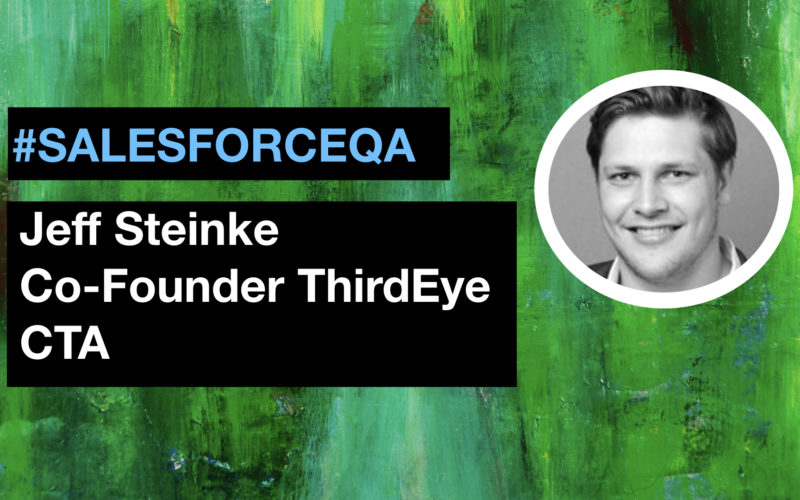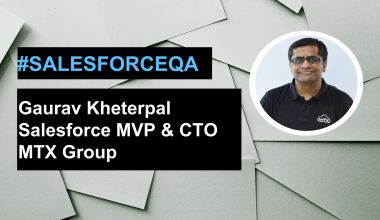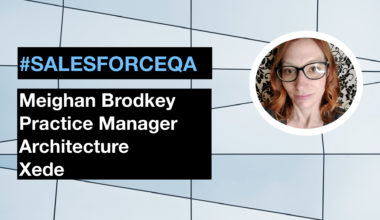In our most recent #SalesforceQA interview, we caught up with Co-Founder of top-tier Salesforce Consultancy, ThirdEye and one of the youngest ever certified Technical Architects, Jeff Steinke.
Jeff talks to us about his unique entry into the Salesforce ecosystem, how he got to become a certified Salesforce Technical Architect at such a young age, offers his advice looking to become a CTA and discusses his thoughts on a low code revolution.
Third Republic (SR): You’ve got quite a story and an interesting entry into Salesforce. Can you talk us through the beginning of your career and how you got into the ecosystem?
Jeff Steinke (JS): You’re right, my journey into Salesforce is a bit of a weird one. I don’t come from an engineering background at all. I studied business management at university, but ended up dropping out and decided to start a tech company with no background in tech. Which turned out to be a very bad idea!
While trying to get that business off the ground, I became a bartender at a restaurant in New York. One evening, some of the regulars were talking about issues they were facing with their technology business.
After speaking with them, it turned out that the questions they were getting from their customers weren’t necessarily technology-based questions. They were more business-based problems, but they were looking at it from a technology standpoint.
I told them about my background in business management and jokingly said that they should hire me to help out. One thing led to another and I was hired! So, having no technology background and never seeing Salesforce before, that’s how I got into the ecosystem and I’ve built my way up from there.
SR: You are a Co-Founder of Salesforce consultancy firm ThirdEye Consulting. Could you explain a little mo#re about what it is that ThirdEye does and how you are different to other partners?
JS: The previous consultancy I worked for grew to be one of the biggest players in the Salesforce market. They were dealing with bigger clients and, specifically in London, we’d seen a lot of acquisitions in the market.
Eventually, the company got acquired by a larger company. It was at that point that I realised there was going to be a big gap in the market. I noticed that smaller to medium-sized companies wanted the experience of working with consultants who had previously worked with some of the largest organisations but still wanted to deliver quickly. As I progressed in my career, I also missed getting my hands dirty. As projects got bigger, I missed the stakeholder involvement that I had.
This is where ThirdEye focuses – small to medium-sized businesses that are going through a digital transformation. We work with businesses on strategic projects, not just tech projects. Helping companies paint the vision for what their digital transformation will look like. We then assist them in the implementation of that vision from a Salesforce perspective. Our consultants also work with their internal teams who implement the other pieces of the strategy that don’t directly relate to Salesforce.
SR: What are some of the benefits and challenges of starting a new player in the Salesforce market?
JS: The immediate benefit that comes to mind, is seeing first-hand the impact that ThirdEye is having on the digital transformation of small to medium-sized businesses and being able to deliver value quickly.
In terms of challenges, at ThirdEye, we made the decision to take no outside funding. It’s obviously very difficult fighting to make a name for yourself in the ever-growing Salesforce industry. When we first started ThirdEye we knew we wanted to deliver great projects and have our customers sing our praises. Initially, we heavily relied on our customers for our marketing.
Now that we’re more established the challenge that we’re having, is finding talent that is the right fit for the company. We want people that love delivering great solutions, that love building. Another, more fun challenge to be facing, is working out how to create an environment where all our employees feel as though they can grow. Continuing to develop one another, has to be the number one priority.
SR: You talk about the low code revolution, what does that mean to you and how are you driving it?
JS: Going back to my earlier days of Salesforce, I always loved to see if I could solve problems that our developers were sure would require code. If there was any time that I could get that win and use the Salesforce platform to solve problems without using code – it was the best feeling.
There are obviously limitations, so eventually, I had to learn to code too! Code is definitely an integral part of delivering great systems and projects. But looking at the Salesforce platform and how it’s evolved, if you leverage its features in the right way, you can provide customers with a platform that they can interact with themselves.
The low code revolution is definitely not saying you should never use code. It’s about being more mindful when using code, ensuring that it’s 100% necessary to the project that you’re delivering. We don’t want our customers to have to employ a team of developers just to maintain their system. It also really helps to deliver much faster systems.
SR: You’re one of the youngest Certified Technical Architects in the ecosystem, could you explain how you achieved this?
JS: Something that really helped with getting the TA certification at such a young age, was the fact that I was able to take on a lot of roles. This is definitely one of the major benefits of joining a company while it’s still in its growth phase.
I had the opportunity to experience various different aspects of the business. I spent a year with developers, a year working with the data team and a year just building different systems. This experience with different customers across lots of different industries definitely gave me the ability to pass the TA. From my perspective, the experience I had was 100% key!
SR: In your experience, what are some of the key traits that you need in order to succeed as a Technical Architect?
JS: This is an interesting one – Salesforce publishes the pyramid where it eventually leads to a career as a TA. I definitely think it’s accurate, however, it’s only covering two pillars when it comes to making it as a TA. Whereas I believe that there are 3 pillars, the additional one being business understanding. From my perspective, you can’t apply all your knowledge as a TA unless you understand what the businesses your working with are trying to do.
There are three key traits that every TA needs to have. The ability to understand the integration-side, platform-side as well as the business requirements. Of course, all TA’s are all different and it’s important to play to your strengths. Try to discover which type of TA you are but stay curious and never stop learning.
SR: What advice do you have to those looking to start their journey to becoming a CTA?
JS: Find a company that will foster you and offers you different experiences. When I was training for the TA, I would sit with our integration teams and technical architects. I would ask them to walk me through how and why to do things.
It’s definitely important to surround yourself with people that you can learn from. Listening to other’s experiences is a great way to learn. Another tip is to connect with people who are great at things that you aren’t so great at, this way you’re always developing.
Finally, remember it’s ok to make mistakes, but it’s essential that you always learn from your failures. Internalise your mistakes and share them with your peers so that they can learn from your experiences.
SR: After becoming a CTA at quite a young age, what is your view on certifications as a whole?
JS: If I had to choose between a candidate with lots of certifications but very little experience or someone with lots of experience and no certifications – I’d choose the person with experience every time! Having said that, certifications are a great way of demonstrating that you understand certain elements of a product.
It’s really important not to certify yourself in something that you’re not going to put into practice. If everyone becomes certified in everything, it will create a market where everyone has certs but can’t implement the software. This will devalue certifications as a whole.
It’s like learning to drive; if you get your license and then don’t drive for years you’re going to be out of touch. It’s the same with certifications, if you don’t apply that knowledge and understanding to real-life situations, you’ll lose that knowledge quickly.
SR: In your opinion, how important is the Salesforce community to career advancement?
JS: I was a bartender and now I own my company – so of course, the ecosystem has so many opportunities. There are so many businesses out there that need great Salesforce consultants. Honestly, working in Salesforce is so much fun! If you love problem-solving, working with new people and constantly being challenged, then the Salesforce community is the place for you.
SR: One of the biggest challenges right now in Salesforce is sourcing and engaging the right talent. How have you tackled this at ThirdEye?
JS: It’s twofold, I think our message out to the market, the fact that we want people that want to build really awesome systems, resonates with a lot of candidates. We’ve been able to find a lot of great people who are the right fir for ThirdEye through our message.
Looking at the wider market, there are a lot of professionals out there who are bored and know that they’re wasting their talent. It’s so important for businesses to make sure everyone has the opportunity to learn and grow. Provide an environment where your employees feel valued and stimulated, give everyone the opportunity to learn.
SR: What are your suggestions for other businesses trying to close the skills gap?
JS: The way to close the gap is finding smart people and training them to be great! It’s not just about what someone did before they got to you, it’s about recognising the talent and working with these people to achieve what they could become.
If you’re a Salesforce professional and would like to be involved in our Q&A series, please get in touch today!


